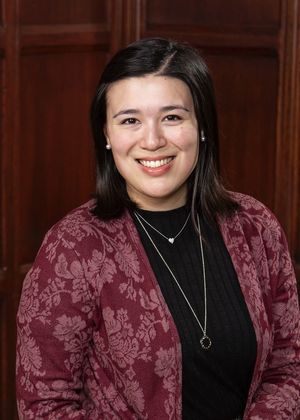Since high school, Erin Albertini has been focused on becoming a bilingual doctor serving children and families.

But the recent Notre Dame graduate’s path to medicine is uniquely intersectional. Eschewing traditional pre-med majors such as biology and chemistry, Albertini instead took on sociology, Latino studies, Spanish and early childhood literacy during her time at Notre Dame, which culminated this May.
These areas, she thought, would help her foster the skills she needed to make a positive impact as a Spanish-speaking physician, one who could help address the unique health challenges that face Latinos and immigrants in the United States.
Switching from a biology major after freshman year was a move to “invest my time in people and cultures,” Albertini says. “All these different aspects of the social world are intertwined with healthcare and medicine.”
And immersion in another culture is critical to becoming a well-rounded and empathetic physician. “It is very important for every physician, every teacher, to have exposure in diverse cultures,” she says.
Indeed, Albertini made it a point to travel during her four years as a Domer. The summer following her sophomore year she went to Argentina on a Kellogg Institute grant to learn about healthcare there and intern at a public hospital in the city of Córdoba. As a junior, she traveled to Denmark to study that country’s universal healthcare system.
More locally, she completed a Cross-Cultural Leadership Program (CCLP) internship at Alivio Medical Center in Chicago’s Pilsen neighborhood. This opportunity, sponsored by the Institute for Latino Studies, was an “extremely formative experience” for the then-rising sophomore, as it allowed her to envision more clearly a future working with Latinos and immigrants in healthcare.
As a senior, she traveled to Arizona as part of Professor Kraig Beyerlein’s Border Immersion Seminar, offered by the Institute for Latino Studies, the Department of Sociology, and the Center for Social Concerns.
“Our trip to the Arizona borderlands in January will live on in my memory as a defining moment of my educational career,” she says.
Through the Institute for Latino Studies, she took three courses that followed a Community-Based-Learning curriculum. CBL, as it’s known, combines aspects of traditional classroom instruction with immersive experiences in the surrounding community. In Albertini’s case, she tutored elementary school-age children in reading at Holy Cross School and La Casa de Amistad in South Bend, in addition to performing administrative and marketing tasks for the former.
It was these hands-on, people-oriented experiences that helped the North Carolina native write the next chapter of her life: a one-year Fulbright fellowship to teach school children English in Mexico.
Founded in 1964, the Fulbright Program is a cultural and educational exchange program allowing recipients to study, teach or pursue important research and professional projects in more than 160 countries worldwide. For the last several years, Notre Dame has been among the top producers of student recipients.
Why did Albertini choose to do a Fulbright in Mexico? In large part she was inspired by working with students in South Bend, as well as the largely Mexican and Mexican-American patient base at Alivio Medical Center. She also wants to keep honing her Spanish and other forms of cultural competency in preparation for her future career. In addition, she’s hoping to partner up with a clinic wherever in Mexico she’s placed, in order to continue doing healthcare-related work.
Then, once the Fulbright is wrapped up, it’s off to medical school, and at least four more years of schooling.
Despite a delay in her fellowship start date due to COVID-19, Albertini is excited to start this new adventure. If anything, the current crisis has refocused her aims, particularly as Latino communities have been disparately affected by the health crisis.
“We have a really important choice: either to look to the past, or to look forward and be the generation to make the changes that are necessary,” she says. “It’s not just about becoming a physician but an advocate.”
To enrich your experience at ND with a supplementary major or minor in Latino Studies, contact Dr. Karen Richman, ILS Director of Undergraduate Studies at krichman@nd.edu